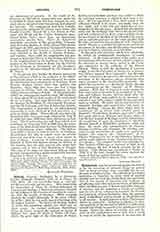

Sylvius, succeeded him and later was called to direct the episcopal seminary in which he had been a student. He was appointed (February 1, 1618) canon of the collegiate Church of St. Amat, and finally dean (January 28, 1622), and to this title was added that of vice-chancellor of the university. Henceforth, absorbed by study and the discharge of his duties, his life was tranquil and undisturbed for thirty years until his death. He was buried in the choir of the Church of St. Amat, and an epitaph engraved on his tomb recalled, with his titles and qualities, his attachment to St. Augustine and St. Thomas as a faithful disciple of one and a lucid interpreter of the other, also his liberality towards the poor and religious, whom he made his heirs.
To his piety and austerity, which were admirable, he united an unchangeable attachment to sound doctrines. At the commencement of his works, as at the beginning of his lectures, he never failed to profess his intention to remain always united to the Faith, and submissive to the authority of the Roman Church. When in 1648 the theologians of Louvain sought to win the University of Douai over to Jansenism, Sylvius opposed them vigorously; but throughout the controversy he preserved the moderation and sweetness of his character; always refraining from angry responses to the attacks of his opponents. He gained his reputation as a theologian chiefly through his commentary on the “Summa” of St. Thomas Aquinas. With that of Cajetan it ranks among the best, and many even prefer it on account of its clearness and fullness; besides, Sylvius wrote after the Council of Trent and profited by its decisions. It contained four folio volumes, which he was prevailed upon to publish. He wrote also several treatises on dogmatic theology and controversy, and some on moral theology. Among his other works may be mentioned: (I) an edition with valuable notes, of Binsfeld’s “Enchiridion theologise pastoralis”, which had great success in Belgium and France, where it was the first manual of theology used by seminarians; (2) resolutions of cases of conscience, in which he showed himself a Probabilist, moderate, solid, and clear. He wrote also commentaries on Genesis, Exodus, Leviticus, and Numbers, the learning, conciseness, and penetration of which were praised by Calmet. He adapted the “Instructions” of St. Charles Borromeo for use of the Church in Belgium, and he made additions to the “Summa Conciliorum” of Carranza. His complete works were published by Pere Norbert d’Elbecque at Antwerp in 1698, in six folio volumes, the first of which contains the life of Sylvius. This edition was reproduced at Venice in 1726; it is the best, though the editor omitted the works of Sylvius against Jansenism.
ANTOINE DEGERT

